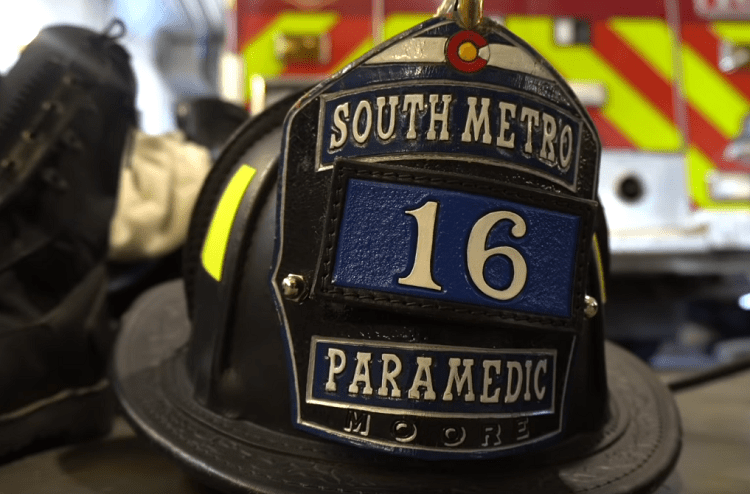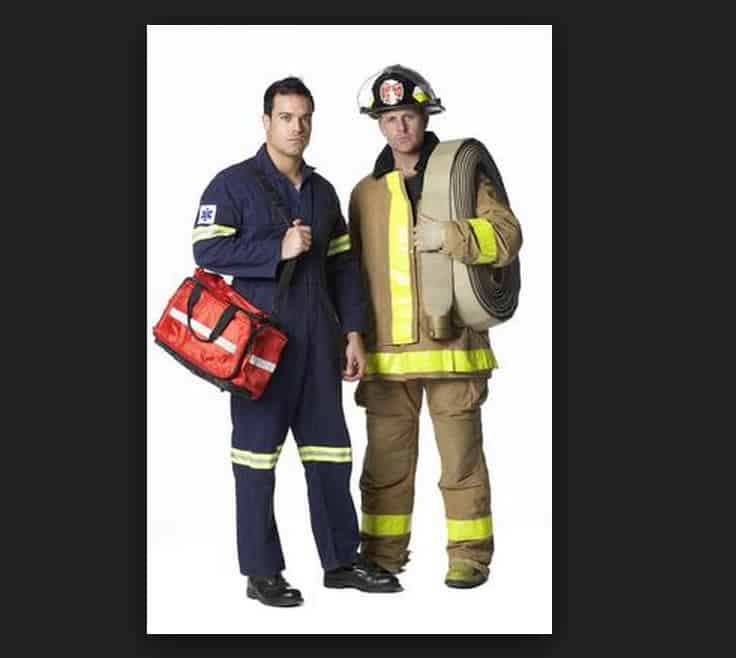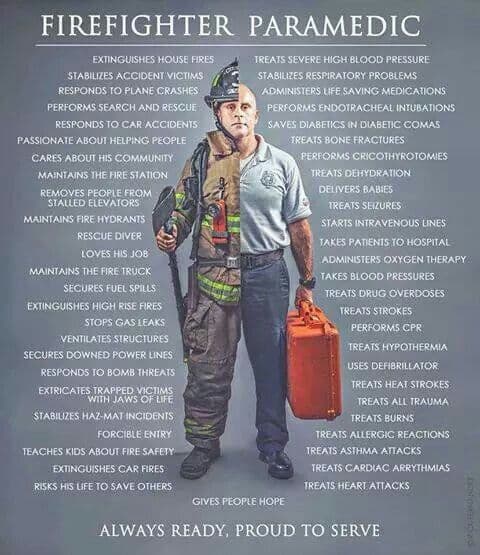
Do I need to be a Paramedic or EMT to be a Firefighter? Firefighting is far from just fighting fires. Most fire departments are very complex in the level of service they provide. Many now operate fire based ambulance service and provide advanced life support services. A a firefighter candidate it is important to know the level of emergency medical service the department you are applying for provides.
The question I receive on nearly a daily bases is “do I need to be an EMT (Emergency Medical Technician) or paramedic to be a firefighter?” This sound like a simple question, however it can very greatly from department to department. I will say that most career fire departments require a minimum of EMT. As for Paramedic, this is only typically required if the department operates a fire based ambulance service.
Mometrix Test Preparation’s Paramedic Exam Secrets Study Guide is the ideal prep solution for anyone who wants to pass their NREMT Paramedic Exam. The exam is extremely challenging, and thorough test preparation is essential for success.
Medical Certification Requirements for Most Fire Departments.
To understand how to answer this question you must first do some research . You need to now the department you are testing for. Research everything you can about the department. Check their website, talk to firefighters on the department, ask questions. This will help you to understand what is required to test for the position. It will also help you to understand what will be required of you after you are hired.
Look for answers to questions such as; Does the department operate at an advanced life support level on all apparatus? Does the department staff and operate ambulances? Or does the department operate at an EMT level and support an outside agency for advanced medial treatment and transport.
Once you have determined the level of medical training required for the department you will need to decide what level of medical care you are comfortable in and strive for.
Does providing advanced medical care interest you? Not everyone likes or can perform in the emergency medical arena. Others love it and are very skilled at it. If emergency medicine does not interest you then look for departments that operate at an EMT or first responder level and support an outside ambulance agency. With this being said, emergency medical response has become a staple response in the Fire Servce. I’ve written a post that will help you understand the reason it is important for the fire department that serves the community to provide emergency medical initial care and assistance to the ambulance service that responds to their area. Click this link to my post, Why do fire trucks respond to medical calls.
Firefighter Minimum Requirements
Requirements to apply for a career firefighter position will vary from department to department. Many factors surrounding the level of service delivery the department provided will often impact the hiring requirements. However, with that being said there are general requirements that will fit the large majority of fire departments.
- Medical certification. Most departments will expect, at the very least, being certified at the Fire Responder level. This is a very general “first aid” level of training. However, now most departments require higher level of medical certification to Emergency medical Technician, EMT, or Paramedic, prior to or shortly after hiring.
- Physical fitness. Firefighting is a very physically demanding career. The candidate must meet a high level of physical health and fitness. A common test for entry level physical ability testing is the Cadidate Physical Ability Test, CPAT. I’ve written a post detailing this test process. Click this link to my post, What is the Firefighter CPAT Test?
- General aptitude. High school education is a must, however, strong general understanding of mechanical operations and mathematics will be focused during the written test. A good ability to follow directions and retain information that is told or seen will also be tested.
- Mental stability. Being able to stay calm during stressful situations in vital to a firefighter. The candidate will need to show his or hers ability to think clearly under duress.
- Ability to work in teams and with others to meet a common goal or objective.
- Most departments require being 21 years of age.
- Honest and trustworthy
How To get Certified as an Firefighter/EMT

Becoming a certified EMT is not a difficult process. Most junior colleges offer Emergency medical training and certification programs. An EMT class will be 120 to 150 hours depending on the program.
While EMTs don’t need a degree, they do need a high school diploma or GED. If you don’t already possess a high school diploma, you need to either finish any outstanding course requirements or pass the General Education Development (GED) examination.
Most EMT training programs require the student possess CPR training to begin the course. Many local and online organizations provide training for certification.
Once you have completed the required program you will then take the National Registry Emergency Medical Technician cognitive exam. A computer adaptive test of between 60 and 110 questions, the exam covers topics such as airways, respiration and ventilation; cardiology and resuscitation; EMS operations; medical care; obstetrics and gynecology; and trauma. The exam usually takes two hours and students can earn between 70 and 120 points. In order to pass, examinees must meet what the National Registry of Emergency Medical Technicians defines as a “standard level of competency.”
You will also be required to pass a skills exam. This will often be administered by the administrator of your training class or program. This exam requires students to demonstrate their ability to successfully perform a number of emergency skills. Examples include conducting patient assessments, managing cardiac arrests, immobilizing spines, caring for long bone fractures, immobilizing dislocated joints, controlling bleeding, managing shock and providing mouth-to-mouth or other ventilation procedures.
How to get certified as a Firefighter/Paramedic

Becoming a Paramedic is much more involved and costly. To be accepted into a Paramedic program you will nee to first be a certified EMT. Paramedic courses can take up to two years to complete and typically requires between 1,200 and 2,000 hours of training. Most programs are 2 years and will require 200 hundred hours or more of clinical training in the field.
After completing the program the testing process with the National Registry administration is very similar to EMT described earlier.
Where to focus right now?
Becoming a Firefighter is a process. It is important to know all the aspects of being a firefighter and understanding the career. The great news is within the fire department there are all levels of training and positions. You do not have to be a Firefighter Paramedic to be able to be firefighter, even on most ALS departments. This can be a step to considered later in your career with most career agencies.
What is important is to know is what interests you and what is required by the department. This will help you to be a good fit for the department while giving you a long and happy career.


